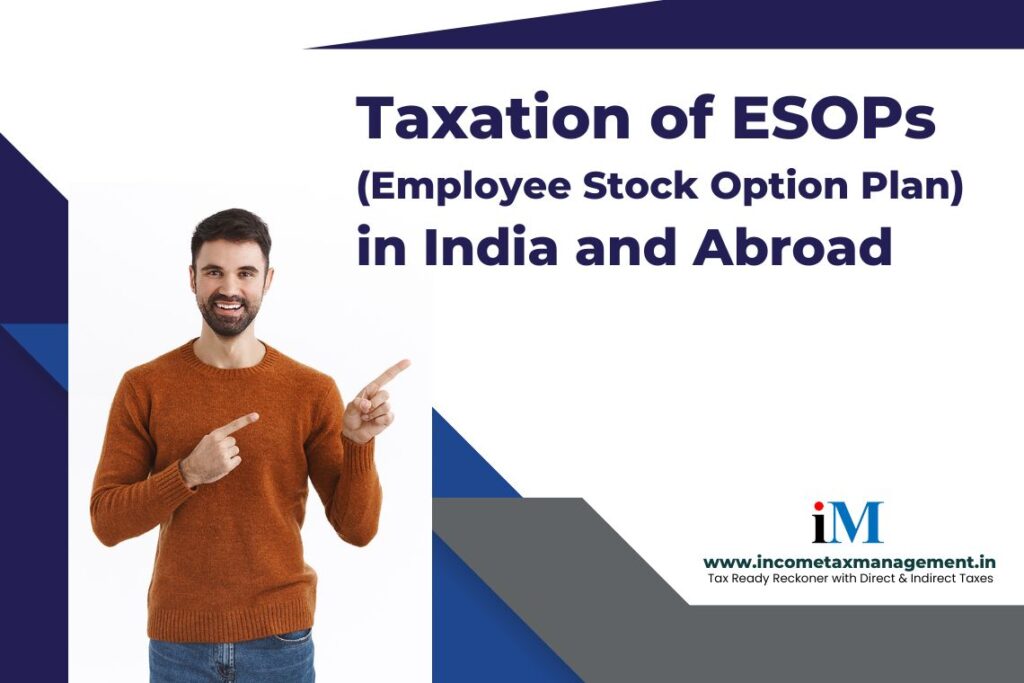Employee Stock Option Plan (ESOP) has gained popularity as a tool for employee retention, especially in startups that may not be able to offer hefty pay packages. ESOPs provide employees with an opportunity to become equity shareholders of the company over a period of time. However, the taxability of ESOPs can be complex. In this article, we will discuss the taxability of ESOPs in India and the scenarios of taxation when the shares awarded under ESOPs or Restricted Stock Units (RSUs) are listed on exchanges outside India.
Taxability of ESOPs Listed in India
In India, the tax on ESOPs is calculated at two stages:
1. At the time of allotment of shares (Exercise):
The difference between the fair market value of the shares as on the exercise date and the amount that the employee has paid for the exercise or subscription to the shares is calculated and taxed accordingly. This taxable value is called Perquisite value. This amount shall be taxed under the head Income from Salary and appropriate tax shall be deducted in form of withholding taxes by the employer itself.
To cover the amount of taxes employer shall sell a certain portion of shares vested to the employee. Even though taxes has already been deducted by the employer employee is still responsible for reporting these transactions in his return of income.
2. At the time of selling the shares:
Tax is levied on any amount of profits or gains arising from such transaction. Such profit is taxable under the head ‘Capital Gains’. Capital gains can further be classified as ‘Short Term Capital Gains’ and ‘Long Term Capital Gains’ depending upon the period of holding of such shares.
For the sake of calculating Capital Gains the cost of acquisition shall be the fair market value of the shares which has already been taxed under the head of Income from Salary in accordance with point 1.
On sale of such shares no withholding taxes are deducted by the employer and the employee himself shall be responsible for not only paying the applicable taxes on gains, if any arising from sale of such shares and also for reporting such transactions in their return of income.
The taxability of such shares if they are listed shall be similar to taxation of any other share and accordingly provisions of section 112A and 111A shall apply and accordingly the period of holding for it to be considered as a long term capital asset shall be one year. However in case of an unlisted share the period of holding shall be two years.
Taxation of ESOPs Listed Outside India
Any form of perks received by the employee for services rendered in India is taxable in India, irrespective of the place and form of benefit received. Hence, the ESOPs granted by a foreign company to the employee of its Indian subsidiary are taxable in India.
The tax treatment for shares that are unlisted in India or listed out of India remains the same. If you own shares of a foreign company, they will not be listed in India. They may be considered unlisted for the purpose of taxes in India. The shares are short-term when held for less than 2 years and long-term when sold after 2 years.
In case Indian MNC is allotting shares of their holding company located outside India, such shares are valued based on the Valuation issued by the India’s Category 1 Merchant Bank and based on such Valuation perquisite value is calculated and the same is taxed in the hands of employees.
ESOPs from foreign companies may also be taxed in the country in which the shares are listed or the company is headquartered. In case the local rules of the foreign country tax it, you can claim benefits under DTAA (Double Taxation Avoidance Agreement).
Types of Stocks Issued Under ESOP
- Employee Stock Option Scheme (ESOS)
- Employee Stock Purchase Plan (ESPP)
- Restricted Stock Units (RSUs)
- Restricted Stock Awards (RSAs)
- Stock Appreciation Rights (SARs)
- Phantom Stock Plan (PSP)
Tax Overview-
| STAGE | TAX TREATMENT |
| AWARD |
|
| VESTING |
|
| SALE |
|
Conclusion
While ESOPs can be an attractive form of compensation, it’s important to understand the tax implications. Whether the shares are listed in India or abroad, they are subject to taxation. It’s advisable to consult with a tax professional to understand the specific tax obligations associated with ESOPs.












